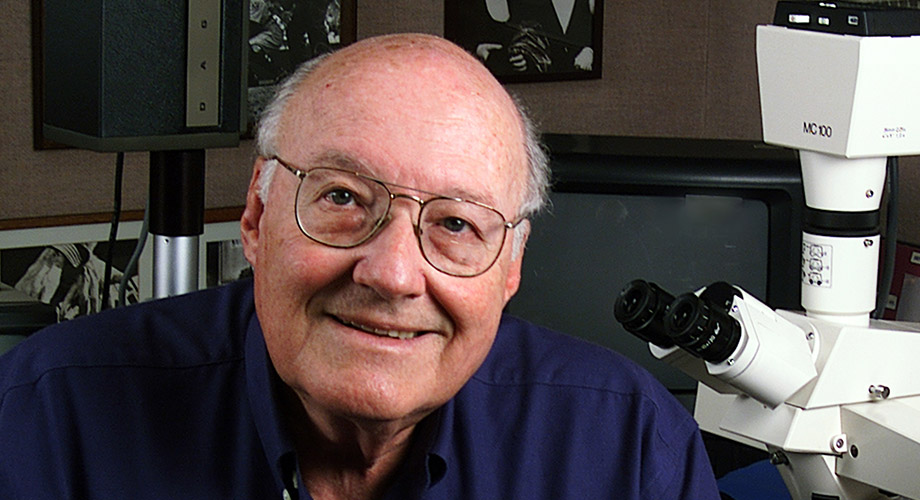
Michael Oldstone, MD. Photo credit: Robert Turner, TSRI Biomedical Graphics
Scripps Research mourns passing of immunology professor and virology pioneer Michael Oldstone
A leader in viral pathogenesis, Oldstone helped shape our modern understanding of viruses and how the immune system responds to these microbial threats.
July 19, 2023
LA JOLLA, CA — The Scripps Research community mourns the passing of Michael Oldstone, MD, esteemed virologist and professor emeritus in the Department of Immunology and Microbiology. He was 91 years old.
Oldstone pioneered and helped establish the viral pathogenesis field, becoming a leader in viral immunity along the way. His foundational research uncovered the role viruses play in different diseases, and how the immune system either helps protect against or ultimately causes those diseases.
“A neurologist by training, Michael made numerous seminal contributions to virology and immunology and has been an extraordinary contributor to Scripps Research and biomedicine broadly,” says Scripps Research President and CEO Pete Schultz, PhD.
In 1966, Oldstone first joined the Scripps Clinic and Research Foundation as a postdoc in the lab of former institute leader Frank Dixon (at a time when La Jolla had “no Interstate 5 highway, the beaches were empty and there were only two restaurants open after nine in the evening,” as Oldstone noted in a past News & Views interview). Over the following decades, he would go on to hold numerous titles at Scripps Research, including professor of molecular and integrative neurosciences from 1989 to 2008, and professor of immunology and microbial science from 2008 to 2017. Oldstone was also an adjunct professor in the Department of Neurosciences at UC San Diego’s School of Medicine.
Much of Oldstone’s work centered around the lymphocytic choriomeningitis virus (LCMV), which is carried by rodents and rarely affects humans. In examining how LCMV infects mice at the molecular level, Oldstone reshaped our understanding of how the immune system responds to viruses more broadly. This included dismantling an earlier dogma about immunological tolerance: he showed that persistently infecting viruses can alter host cells, cause disruptions in homeostasis and eventually lead to certain diseases. Later, it was found that these discoveries could also be applied to other chronic viral infections, including hepatitis B virus, Epstein-Barr virus and HIV.
Oldstone won numerous awards for his scientific contributions and mentorship, including the Excellence in Mentoring Award from the American Association of Immunologists, the Pioneer in NeuroVirology Award from the International Society for NeuroVirology, the R.E. Dyer Lectureship and Directors Award from the National Institutes of Health (NIH), and the J. Allyn Taylor International Prize in Medicine, among many others.
“He trained an impressive array of coworkers, including more than 25 who went on to full professorships at major institutions,” Schultz adds.
Oldstone was elected to the National Academy of Medicine in 1996 and the National Academy of Sciences in 2008; he was a member of the Scandinavian Society of Immunology, the American Association of Physicians, the American Clinical and Climatological Association, and the American Society for Clinical Investigation. He was also an editor for Virology; Current Topics in Microbiology and Immunology; served on the editorial board for multiple journals such as the Proceedings of the National Academy of Sciences (PNAS) USA, Cell Host & Microbe and Immunity; and published the book Viruses, Plagues, and History—a detailed account of how viruses have evolved over time.
Born in Manhattan and previously serving as an officer in the 82nd Airborne for the United States Army, Oldstone later went on to receive his MD from the University of Maryland. During his medical schooling, he had decided to pursue a career in scientific research because he “thought that if you want to practice medicine, you really have to understand the disease process and then how to treat it,” as he said in a prior interview with PNAS.
Oldstone is survived by four generations of family, including his wife, Elizabeth Hoster Oldstone; his daughter, Jennifer Oldstone-Moore, PhD; his two sons Michael Oldstone, Jr. and Christopher Oldstone; his six granddaughters, Caroline Oldstone-Jackson, Aileen Oldstone-Moore, Madeleine Oldstone, Faye Oldstone, Raina Oldstone and Marilee Oldstone-Moore; and a great grandson, Gabriel Oldstone-Jackson. His family asks that donations be made to the humanitarian medical care organization Doctors Without Borders.
For more information, contact press@scripps.edu

